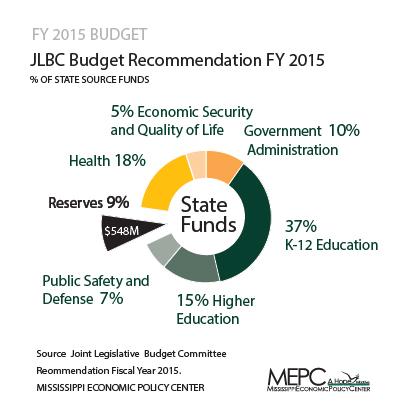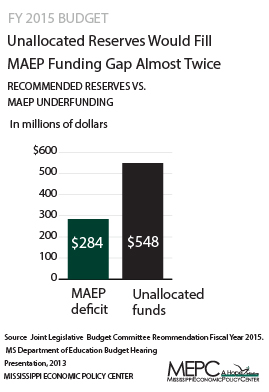Joint Legislative Budget Committee Recommendation Underfunds State Priorities to Build Up Reserves
December 10th, 2013
 The Joint Legislative Budget Committee presented a budget recommendation for next year (FY 2015) that is $246 million under the total budget recommendation of Governor Phil Bryant released a few weeks ago. The JLBC budget leaves $548 million unallocated for reserves. The appropriations recommended in the budget total $5.86 billion.
The Joint Legislative Budget Committee presented a budget recommendation for next year (FY 2015) that is $246 million under the total budget recommendation of Governor Phil Bryant released a few weeks ago. The JLBC budget leaves $548 million unallocated for reserves. The appropriations recommended in the budget total $5.86 billion.
The pie chart on the left shows the recommended appropriations by purpose. The unallocated portion makes up 9% of the budget—a greater amount than public safety and defense, and economic security/quality of life.
Compared with current year funding, the recommended budget would provide a small increase for higher education, including some drop out recovery funds and a small increase for specific K-12 program, including some education literacy programs, and teacher supply funds.
The Department of Revenue is also recommended for an increase. The increase would increase tax collection personnel. The funding used to increase staff at the Department of Revenue will be offset by the resulting increase in tax collections.
Reductions in many agency budgets would come by removing funding for vacant positions and reducing funding for equipment, travel and contractual services. Level funding is recommended for the Mississippi Adequate Education Program, Student Financial Aid, Vocational Education, and the Military Department. Level funding for the Mississippi Adequate Education Program would mean another year of underfunding for the formula that supports our schools. The last year it was fully funded was in 2008. The recommended amount would underfund MAEP by and estimated $284 million. This means that the unallocated funds are almost twice that of the gap between the recommended budget and full funding.
Leaving such a large amount for reserves is like stuffing state funds under a mattress when they should be invested in our state’s future. Investments in the state’s priorities, like the education of our children, are vital to the long term success of our economy.







